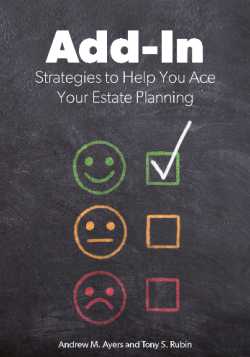 A common question from my clients is "Do I have to tell my family what's in my will?" The short answer is "No" and you don't need to tell anyone what's in your estate plan if you don't want to. Many people choose to either not tell anyone or only give a high-level summary of their estate plan to their family members. But it can also be a good conversation to have with family members so that expectations are set at the right level and your loved ones have an idea of what your plans are for your legacy. Especially if you have a certain "philosophy" behind why you have set up your estate plan in the way that you have, it's important that your loved ones understand it.
A common question from my clients is "Do I have to tell my family what's in my will?" The short answer is "No" and you don't need to tell anyone what's in your estate plan if you don't want to. Many people choose to either not tell anyone or only give a high-level summary of their estate plan to their family members. But it can also be a good conversation to have with family members so that expectations are set at the right level and your loved ones have an idea of what your plans are for your legacy. Especially if you have a certain "philosophy" behind why you have set up your estate plan in the way that you have, it's important that your loved ones understand it.
Where Are Your Documents Located?
Even if you don't want to talk about what your documents say, you should at least let your loved ones know where your important estate plan documents are located. One of the most frustrating things about trying to be an executor of someone's estate is when you are stuck trying to piece together their wishes and are forced to look for documents. It happens more frequently than you think and it often falls into one of these categories:
- Your personal representative has no idea where the documents are;
- You've put the originals in a safe deposit box and now your personal representative has to go court to get it opened;
- Your personal representative can find them immediately.
If you'd like to fall into the third category, one document that my clients have found helpful is the My Personal Planning Essentials checklist, which you can download for free and use even if you aren't a client of mine. Even if you don't tell your loved ones what's in the documents, you should at least leave some kind of a guide for where the documents are located. Especially if you have healthcare documents that need to be accessed if you become sick, you don't want these documents hidden away or stuck in a safe deposit box where your loved ones can't access them.
What's In Your Documents?
If you choose to talk to your loved ones about what's in your documents, you can decide how much information you choose to share. Some people are comfortable just providing a copy of the documents to their loved ones, while others choose to just summarize the contents.
If you've got children who are under 18, then hopefully your estate plan has a guardian structure for them and it's probably a good idea to make sure that the guardians know that they are likely to be appointed if something happens to you. Similarly, if you have a pet, you may have set up a pet trust and have provisions for a caregiver for the pets and it helps to have information for them about your pets and what they'll be expected to do.
If you are planning to cut someone out of your estate or are choosing to give more to one family member than others, you may not feel comfortable sharing this information with your loved ones. That is your prerogative, you won't be around to experience any drama that may cause. But if you are going a more traditional route, it may make sense to have these discussions with your loved ones.
You May Also Like
- What is a Testamentary Trust?
- What is Simultaneous Death in an Estate Plan?
- What Does an Executor of an Estate Do?
Next Steps
If it's time to update your estate plan, or create one for the first time, let's set up a complimentary Legal Strategy Session and discuss the best options for you and your family.


